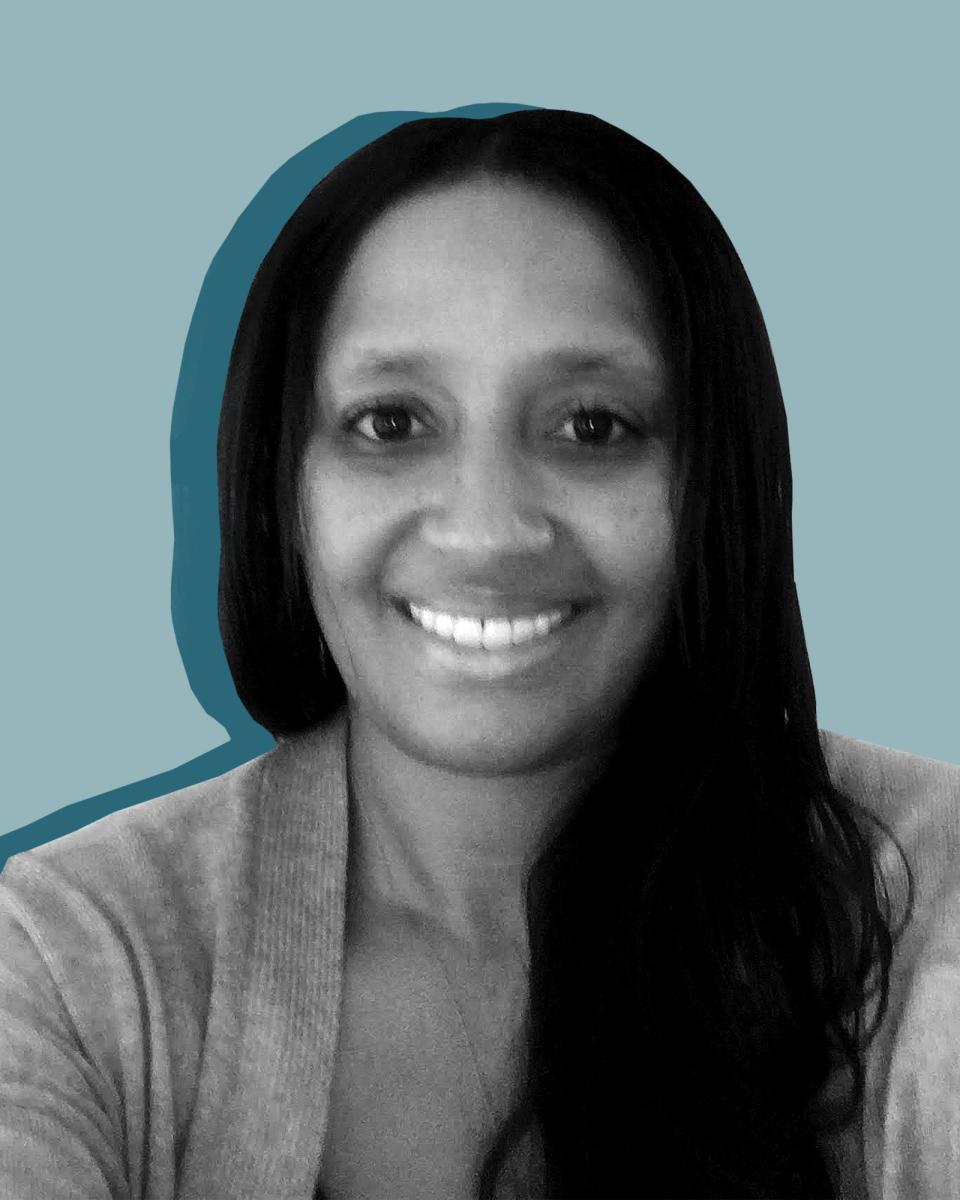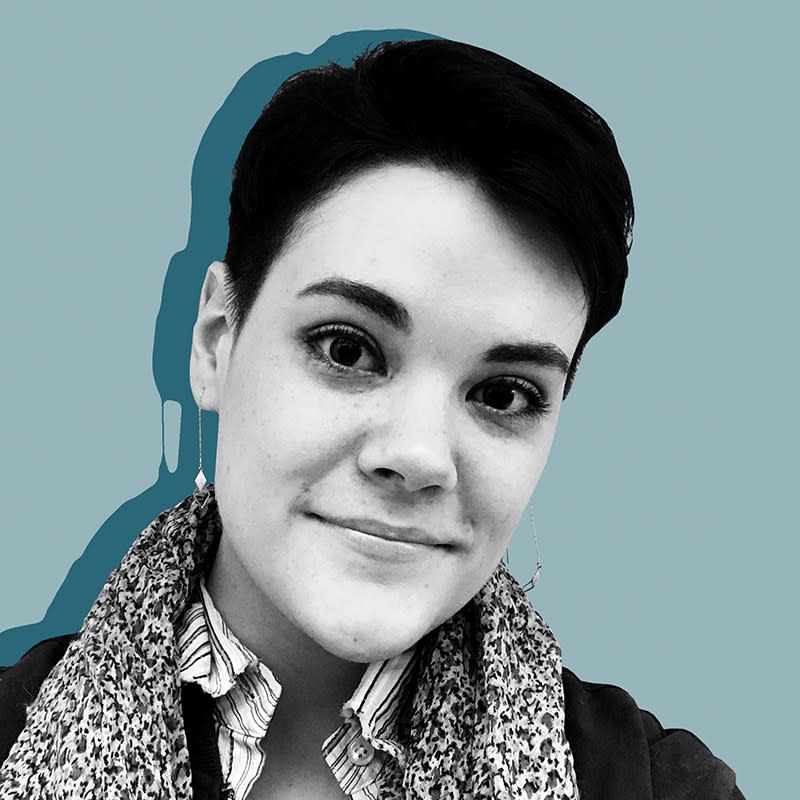Living With Flat Affect: Like 'Resting Bitch Face' But Not Funny
We live in a time when “resting bitch face” is a joke, selfies are constant, and activist art implores us to stop telling women to smile: We’re as aware of our faces as ever. But the conversation still largely excludes people who don’t always have control of theirs: people with a flattened affect.
In psychology, the word “affect” refers to someone’s variability in facial expression, pitch of voice, and the use of hand and body movements, according to a University of Washington Department of Psychiatry glossary. A person’s affect can be “broad” (which is the norm), “restricted” or “blunted” (which both mean pared back in some way) or “flat”: lacking signs of affective expression, or having a monotonous voice and unmoving face.
Think about the time you’ve wasted wondering if you made an awkward face when trying to remember if you knew that person you ran into on the street, or if you scrunched your eyebrows too much in that job interview. For people with flat affect, emotional expression is limited, reduced or nonexistent. This isn’t an illness or a disorder in its own right, but a possible symptom of many brain conditions, such as depression, Parkinson’s disease, autism, traumatic brain injury and schizophrenia, according to the American Psychiatric Association’s Diagnostic and Statistical Manual of Mental Disorders (DSMV).
Flat affect is the face of lethargy and voice of apathy: no eye rolling, no winking, no smirking. “The rise of 'Resting Bitch Face' is kind of a step in the right direction,” says 30-year-old Kaille Kirkham, who says she was diagnosed with depression at age nine, and experiences a flattened affect. “Because it explains, no, my face doesn't match with my feelings—don't assume it does.”
Kirkham explains it like this: “You're constantly expending energy trying to either display emotions you don't feel, or explain yourself to people who perceive your expression negatively.” For her, her expressiveness dims when her depression is at its worst. Though experts are mixed on whether depression on its own leads to a flat affect, Kirkham describes a lack of connection to her emotions that she says reads across her face. “I’m mostly just exhausted at that point and have a hard time caring about anything, including how others perceive me.”
At the University of the Southwest in New Mexico, where Kirkham received her Master’s in counseling, she came across a description of flat affect in a textbook, and she saw herself.
“I immediately recognized it,” she wrote in an email to Glamour from Tokyo where she now lives and works as an English instructor. “I've been masking my emotions in public settings since I was very young.” She says she was diagnosed with bipolar disorder at age 19, and before that her childhood was tough; her parents chose to homeschool her to protect her from the “emotional ringer” she was put through at school. “Mental illness runs through both sides of my family, so even though at six I couldn't articulate my depression and anxiety, my father recognized it.” Maybe he saw it on her face.

Jeffrey Lieberman, M.D., professor and chair of psychiatry at Columbia University, said that flat affect exists on a spectrum of severity, and most who experience it, don’t even know they have it. “[Flat affect] can create a dissonance in terms of how you think you’re making your way through the world and navigating day-to-day activities and what’s really happened. You’re getting a reaction from people that doesn’t align with your own self-image.” And that experience can be tough. “Expression of emotion is an integral component of personal well-being; if someone’s emotionality is unusual in some way, that’s potentially consequential. Just like if you had asthma and you suddenly couldn’t exercise—it limits you.”
Let’s say your co-worker, in a single conversation, shares both good and bad news: she got a promotion and her dog died. Your face would react without you having to say a word: your eyes opening in celebration; or the soft exhalation of a breath, as your mouth turns down to show empathy. For someone with a flat affect, their mouth may remain a straight line, or their tone of voice unchanged. It’s like a dial tone instead of a greeting.
Having a school textbook put a name to symptoms like this is an experience Kirkham shares with Wakilah Majied, 35, who came across the definition of flat affect last year in an abnormal psychology course at community college. The New Orleans-based substitute teacher says she thought, "Wow, I have this. This has to be what I experience."
Majied’s flat affect was a symptom of her schizophrenia, a diagnosis she says she received at 28. She sees a psychiatrist about once a month to discuss how she is, and to titrate her medication, but says visits are short; her face hadn’t come up. But when she read the description—“still faces that show less anger, joy, and other feelings than most people"—the words on the page seemed to bridge a bewildering chasm between how she felt and how she knew she came across to others.
“I don't want to give off that reaction as if I'm not welcoming, that I'm not friendly,” Majied says. But, throughout her life, she has heard that she gives that impression. As a teenager, she says her classmates and teachers told her she looked sad. Her own sister once said she noticed her appearing robotic, a blunt version of her former self. At her first job out of college, she was introduced to a co-worker’s friend, and said she was happy to see her social life beginning to develop, only to later hear that the friend thought Mejied “didn’t like her.” In an email to Glamour, Mejied wrote that these comments made her think, “it must be something going on with my facial expressions and body language.”
Mejied describes a disconnect that flat affect can create between the emotions someone feels (excitement to meet a new friend, for example) and the emotions they are able to express (such as with a heightened tone of voice, engaging eye contact or a warm expression). A study published in The American Journal of Psychiatry found that flat affect is common but not omnipresent in people with schizophrenia and depression, but some people with flat affect can move through life completely blunted.
An expressionless face might seem like no biggie when you consider the severity of delusions that people with schizophrenia can also experience (Majied said she endured terrifying visual hallucinations in her twenties, including seeing strange men on her wall and hearing voices). Not so, says Bethany Yeiser, 36, founding president of CURESZ Foundation (Comprehensive Understanding via Research and Education into Schizophrenia). “Flat affect is a devastating symptom. You might think, ‘Oh well, you're just not quite interested. You're a little aloof.’ But for me, that's not what it was. The biggest thing I found with flattened affect is relationship problems. I loved my mom, but I just couldn't express that love.”

Yeiser was 20 years old and studying at the University of Southern California when she started to experience negative symptoms of schizophrenia, including flat affect. “I didn't know that I had it, but looking back, my parents remember seeing me during an online phone call. They said my face was just like a rock,” she told Glamour over Skype.
Dr. Lieberman says that flat affect is just one behavioral symptom that occurs in a constellation of features of different illnesses, and they aren’t all psychiatric. It also shows up in developmental disorders such as autism, and degenerative ones including parkinson’s.
“We may disregard someone with facial masking because their facial expressions, or lack thereof, go against our social expectations. Also, it can be difficult to trust verbal communication when the facial expression doesn’t match the sentiment,” a daughter wrote in a blog post about her father’s Parkinson’s and the flat affect (or “facial masking” he experiences as a result).
As if literal communication hurdles weren’t challenging enough for people experiencing this, “flat affect” is also being tossed around online as an insult. A search on Twitter delivers pro-gun activists claiming Parkland survivor David Hogg has a flat affect, as well as critics speculating that Sarah Huckabee Sanders has it. Of course, these mentions are politically loaded and mired in the stigma that surrounds mental illness, but they do raise an important point: people can appear flat, either intentionally (say, when speaking about emotionally charged topics in the public eye) or as a feature of their personality (a tendency toward seriousness, for example).
Another painful reality is medical treatment that itself comes with flat affect as a side effect. A paper published in International Journal of Bipolar Disorders concluded that antidepressants such as SSRIs can cause emotional blunting and so can antipsychotics, according to a study by the Department of Psychiatry at Stellenbosch University and published in the journal PLOS ONE.
Bethany Yeiser experienced this. Her mother, Karen Yeiser, a nurse and author of Flight From Reason, a memoir about her daughter’s mental illness and recovery, told Glamour that within hours of Bethany taking one drug for her schizophrenia, a blank stare started to form on her face. “When she was at her sickest, with untreated schizophrenia, she was actually more animated and full of expression, much more than when she went on medication that had the side effect of flat affect.” That's just the price you pay, she adds: “Sometimes you have to tolerate certain side effects in order to get medicine that saves your life.”
But Yeiser did end up switching medications. In an email to Glamour, Karen Yeiser wrote, “Recovery was like watching her personality slowly emerge from within a dense cloud and into the light of the sun.” Dr. Lieberman confirmed that the reversal of flat affect could indicate a “measure of the efficacy of treatment.” Yeiser went back to school to earn her B.S. in molecular biology and went on to write the memoir Mind Estranged: My Journey from Schizophrenia and Homelessness to Recovery.
Others are still the journey to finding a medication that fits, and a way to move through life with this symptom. Mejied says, “I have to pay attention to my reactions to the different medications. I don't want my behavior to change, with regards to how I'm interacting with my family and the outside world. I worry about that.” To combat her fears about how others perceive her, she says she sometimes forces herself to form facial expressions by reminding herself to try to smile back when someone smiles at her: a gesture that comes so naturally to most. “I do my best to give that same energy back to someone, but it doesn't always come across the way that it's supposed to.”
Kirkham says it comes down to acting, which she took classes for as a kid and now does constantly—offstage. “When I’m not depressed or manic, I’m generally a bubbly, positive, and funny person. When I’m dealing with a flat affect, I have to keep that up, both to maintain the quality of my lessons, and so that nobody catches on.” And that’s no easy feat.
“It’s absolutely exhausting to pretend I feel something when I don’t, because I’m constantly thinking about smiling, laughing, keeping my voice energetic and chirpy—it’s acting, but for eight to nine hours a day. When I finish, it’s almost a relief to let it all just slide off my face and be flat.”


